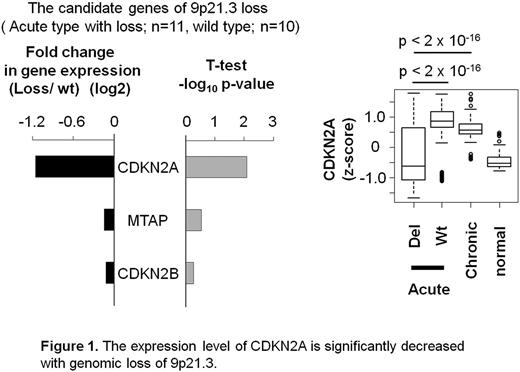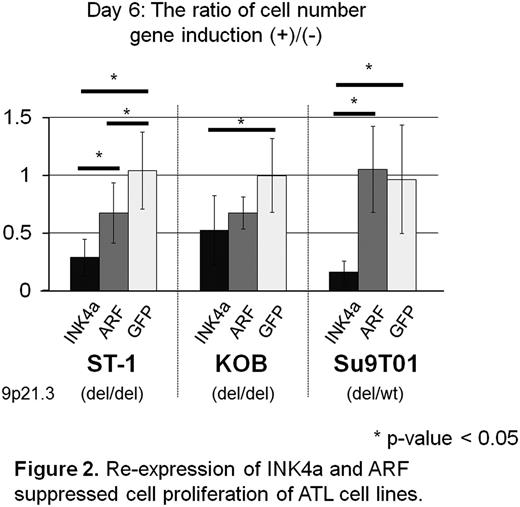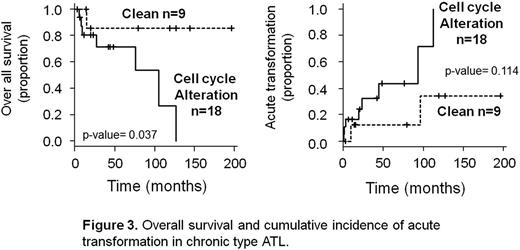Abstract
Adult T-cell leukemia/lymphoma (ATL) is a human T-cell leukemia virus type-1-induced neoplasm with four clinical subtypes; acute, lymphoma, chronic and smoldering. Although chronic and smoldering subtypes are regarded as indolent ATL, about half of these cases progress to acute type ATL and subsequent death. Therefore, cases of indolent ATL also have poor prognosis and acute transformation is a predictive indicator for patients with indolent ATL. However, the molecular pathogenesis of acute transformation remains unknown. In the present study, oligo-array comparative genomic hybridization (CGH) and comprehensive gene-expression profiling (GEP) were applied to 27 and 35 cases of chronic and acute type ATL, respectively, in an effort to delineate the molecular pathogeneses of ATL, and especially the molecular mechanism of acute transformation.
All DNA and RNA used in this study were extracted from purified CD4-positive cells. Oligo-array CGH analyses and comprehensive GEP analyses were performed on 27 and 35 cases of chronic and acute type ATL, respectively. Subsequently, we established Tet-OFF ATL cell lines for functional analyses.
Oligo-array CGH revealed that genomic loss of 9p21.3 was significantly characteristic of acute type ATL, but not chronic type ATL (p-value= 0.039). Although the minimal common deleted region of 9p21.3 contained MTAP, CDKN2A and CDKN2B, the expression level of only CDKN2A was reduced with genomic loss of 9p21.3 (Figure 1). Moreover, analysis of serial samples of a chronic type ATL patient showing acute transformation also revealed that reduction of CDKN2A expression by 9p21.3 loss was associated with acute transformation in this case. CDKN2A contains two known variants, INK4a and ARF. Re-expression of INK4a and ARF suppressed proliferation of Tet-OFF ATL cell lines, while the suppression efficiency of INK4a was stronger than that of ARF (Figure 2). In cell-cycle assays, the induction of INK4a and ARF decreased the proportion of S-phase cells. Additionally, re-expression of INK4a also increased the amount of apoptotic cells in induced cell lines, while re-expression of ARF did not have this effect. Since CDKN2A is a well-known cell cycle regulator, deregulation of the cell-cycle might be involved in acute transformation of chronic type ATL. In fact, deregulation of the cell-cycle pathway has been reported as a predictive indicator for the outcome in diffuse large B-cell lymphoma patients (Cancer Cell, 22:359-372). Therefore, we examined whether chronic ATL patients had alterations in cell-cycle related genes and found that chronic ATL patients could be divided into two groups. The group possessing alterations in these genes (referred to as “Cell cycle Alteration”) showed poorer prognosis compared with the group lacking such alterations (referred to as “Clean”) (p-value= 0.037) (Figure 3). Additionally, patients with such alterations tended to have earlier progression to acute type ATL.
These findings indicated that cell cycle-related genes play an important role in acute transformation and should serve as good prognostic markers for chronic type ATL.
No relevant conflicts of interest to declare.
Author notes
Asterisk with author names denotes non-ASH members.




This feature is available to Subscribers Only
Sign In or Create an Account Close Modal